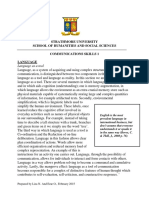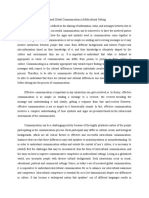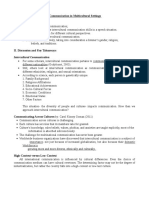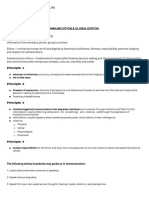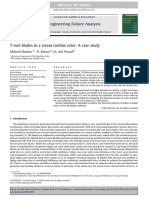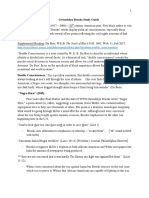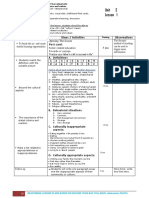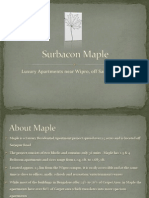Appropriateness in Language Use: A Balancing Act of Nuance and
Connection
There is more to language than just a set of words; it is actually a reflection of our
thoughts, our values, and our desire to connect with others. But have you ever
stopped to question why one conversation flows, whereas another one stays quiet
and feels awkward, even though the words may seem correct? Well, a whole lot lies
in that factor denoted by the term appropriateness; appropriate employing of
language to relate to the ever-changing aspects of context, culture, and emotion.
Appropriateness, in fact, is what governs us in our use of language: this afternoon,
for instance, to say, "What’s up?" or to say "Good morning," keeping in mind that
it's not a trivial matter at all. It matters whether we communicate or fail to
communicate with another person. It's not merely communication-it's connection.
Essentially, appropriateness is knowing what words, what tone, and what style
would be appropriate for what audiences, contexts, and purposes. Contextual
appropriateness, for example, would require that our words align with the situation.
So, for instance, if we open a formal presentation with the words "Yo, dudes, let's
dive in," as this might be a great icebreaker with one's friends, it would be judged
rather awkward if a stranger attempted to use it in a formal setting. Then, there is
the cultural appropriateness, this is about understanding how gestures, jokes, or
even phrases mean totally different things across societies and cultures. So, a
thumbs up, for example, in one country might mean approval, whereas in another
country, it might be regarded as offensive. This is exactly what linguistic
appropriateness means: the complexity of any part of our language needs to be
such that it is understood at the particular time by the listener. For example, one
may talk at a level like explaining the whole subject of quantum physics to a small
child, and at another time, it may be totally different-the way you present quantum
physics to a group of scientists. Similarly, social appropriateness will range from
talking to a near friend to addressing a CEO. The most delicate of them all,
emotional appropriateness, will require you to read the room and then choose the
correct words appropriate for the mood. A joke at a dark moment could destroy
trust, while kind concern at a tense moment could build a bridge.
If language were to form the bridge between minds, then appropriateness would
serve as the very strong foundation which keeps it erect. Otherwise, the whole
foundation crumbles. Appropriate language builds trust and rapport and expresses
respect and empathy. If someone misunderstands what another person has said, it
is most likely due to the vocabulary of his statement. In a professional context,
appropriateness is perceived as competence and credibility from the side of an
employee. Along with this, it also helps in dealing with power dynamics that require
ensuring a respectful and polite approach towards authority figures. While it is a
stage understood by its appropriateness, it is not free of trouble. Cultural diversity
in an increasingly globalized world gives rise to such a clash: what is appropriate in
one place becomes inappropriate in another; direct criticism may be seen in
Western scenarios as constructive but, for many Eastern societies, appears rude.
�Complicating matters, norms also change; language is always evolving and keeping
up with it is hard work. Words and phrases thought about a decade ago as
acceptable may today be considered "dated" or even offensive in subjects relating
to gender and identity. Added to this is the subjectivity of appropriateness, as
tastes differ very much from one another and what becomes natural to one person
might seem too formal or casual to another; in real life, they commonly require
balancing on several criteria simultaneously, such as linguistic clarity, cultural
sensitivity, and proper behavior at work.
Some think that it is an integral part of communication that facilitates the free flow
of ideas and respect for each other. For example, formality in professional
engagements or cultural sensitivity in international dealings can prevent
misunderstandings. On the other hand, those opposed will claim that strict ideas of
appropriateness bar creativity and will lead to estrangement of persons foreign to
such conventions. For example, most non-native speakers have difficulty in
unwritten rules of appropriacy and suffer inadequate judgments about their
intelligence or competency. So, should there be any question of appropriateness
always being about sticking to rules, or should it also embrace connection? Maybe it
lies more in empathy, adaptation, and intent than in rigid adherence.
Appropriateness is something that can be cultivated through practice and
awareness. Listening actively helps tune decibels to words as the other person
communicates with someone else, so it is possible to change or adapt. Immersing
ourselves in different cultural contexts through travel, media, or conversations
would seriously broaden our level of understanding. Peer and mentor feedback
could also help us reflect on previous interactions so that we can identify
improvement areas. Together with flexibility, there is the need to consider empathy,
that means, we should try to get along with the needs and emotions of the audience
instead of rigidly following the rules. When mistakes are understood and absorbed
as chances of learning, they ultimately lead to expansion and greater maturity
linguistically.
Appropriate language use is art and science. It requires a profound understanding of
context, culture, and emotion. This needs to be flexible to the constantly evolving
norms and situations one finds oneself in. It's not an easy skill to acquire, but it sure
has a lot in store for a person as it opens up a world for a person to create genuine
rapport, mutual respect, and effective communication, in fact, it never goes beyond.
So next time when you speak, ask yourself, Am I appropriate or just correct?
Because in the end, language is not about using the right words; it's how one uses
them. Although language is sometimes poisonous in certain contexts it is also what
makes really magic, communication.




